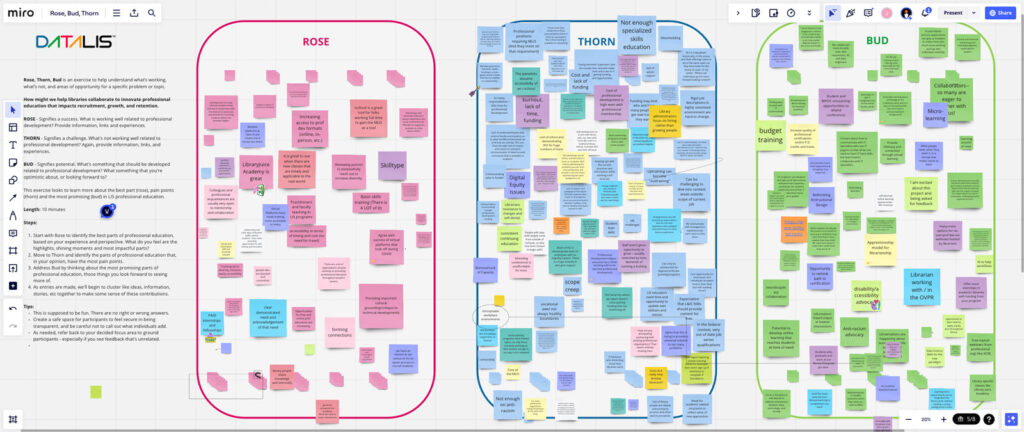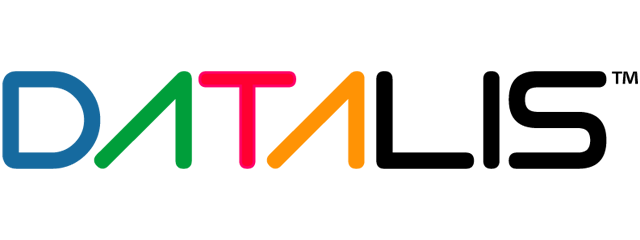In the kickoff LEARN event for DATALIS, participants contributed over 200 ideas related to the core DATALIS problem: How might we help libraries collaborate to innovate professional education that impacts recruitment, growth and retention.

Using AI and human review, we analyzed these 200+ ideas to generate ten themes each for our Rose, Bud and Thorn activity. A lot of these themes are familiar – challenges new graduates face in aligning their skills with library needs, changing funding models and financial constraints, and an ongoing shift in skills needed within libraries.
These themes will inform the next phase of work in DATALIS – our WORK workshops. To register for one of our WORK workshops on February 7, 8 or 15 visit: https://www.eventbrite.com/cc/datalistm-2919479
Your insight and comments on our initial dataset will be used to seed this workshop – you can add comments to our shared Rose, Bud, Thorn theme sheet.
| Area | Theme | Description |
|---|---|---|
| Thorn | Challenges in Professional Development | There’s a clear theme of the difficulties faced in continuous professional development, including the mismatch between available training and actual job requirements, high costs, lack of time, and issues with online learning modalities. |
| Thorn | Inadequate Hiring Practices and Workforce Management | The text highlights the struggle in hiring people with specific expertise (like management experience), the limitations of rigid job descriptions, and the disparity in how different staff members are valued and compensated. |
| Thorn | Changing Funding Models and Financial Constraints | The shift to a grant-centric funding model in libraries and the associated instability and sustainability issues are a significant concern. Also, there are challenges related to the high costs of professional development and education. |
| Thorn | Technology and Skill Gap | There is an emphasis on the gap between the skills taught in library and information science (LIS) programs and the practical skills needed in the field, particularly in areas like data science and human-computer interaction. |
| Thorn | Institutional and Organizational Challenges | This includes resistance to change within libraries, bureaucratic hurdles, and issues with existing professional organizations. The theme also touches on the lack of support for library staff in terms of professional growth and development opportunities. |
| Thorn | Educational Program Limitations and Accessibility | The text points to the limitations in LIS educational programs, including their inability to keep up with current practices and the lack of specialized training. Accessibility of these programs and the expectation of prior knowledge or experience are also concerns. |
| Thorn | Mentoring and Career Development Issues | There’s a theme surrounding the challenges in mentoring, particularly the lack of support for mentors and the exclusion of mid or later career individuals from mentoring programs. |
| Thorn | Workplace Culture and Environment | Issues such as burnout, lack of capacity, vocational awe, and unhealthy work-life boundaries are highlighted. Also, there’s mention of inhospitable workplace environments and the resistance to change among library staff. |
| Thorn | Equity and Diversity in the Workplace | The text touches on issues related to diversity, equity, and inclusion (DEI), such as challenges in implementing DEI training and the disparity in how people from different backgrounds are treated and compensated. |
| Thorn | Impact of Digital Transformation and Online Learning | The shift towards online learning and its challenges, including digital equity issues and the varying effectiveness of online programs, is a recurring theme. There’s also a concern about keeping up with technological advancements and integrating them into library services. |
| Rose | Integrated Learning and Working Opportunities | Emphasis on the value of assistantships and internships that provide both education and practical experience in the field, including paid opportunities that enhance learning. |
| Rose | Innovative Hiring and Placement Processes | The development of new student hiring processes that facilitate job placements for library school students, highlighting the collaboration between libraries and educational institutions. |
| Rose | Professional Networking and Collaboration | The importance of building a network of professional colleagues, mentorship opportunities, and collaboration across different types of libraries for skill sharing and innovation. |
| Rose | Flexible and Diverse Professional Development | Increasing access to professional development in various formats (online, in-person) and through different platforms to accommodate diverse needs and schedules. |
| Rose | Real-World Relevance in Education | The introduction of timely and applicable classes in library and information science programs that address current real-world challenges and trends. |
| Rose | Advancements in Virtual Learning Platforms | The success and accessibility of virtual platforms for training, especially highlighted during the COVID-19 pandemic, making education more accessible. |
| Rose | Diversity, Equity, Inclusion, and Accessibility (DEIA) in Curriculum | Integration of DEIA principles into the core curriculum of library and information science programs, moving beyond elective courses. |
| Rose | Role of Ethics in Librarianship and Technology | The recognition of the ethical tools provided by librarianship, especially in the context of the fast-paced technology sector. |
| Rose | Fusion of Traditional Library Roles with New Technologies | The growth of library positions that blend established library frameworks with new technological approaches, reflecting the evolving nature of the field. |
| Rose | Enhanced Support and Recognition for Graduate Students | Focusing on treating graduate students as peers, offering them skilled-labor pay, and acknowledging their contributions to the field. |
| Bud | Positive Job Outlook in Academic Librarianship | The expectation of good job prospects for academic librarians due to mass retirements, indicating a generational shift in the workforce. |
| Bud | AI and Technology Integration | Exploration of how artificial intelligence (AI) and robotics can enhance library work, increase creativity, and improve workflows, despite some skepticism about AI’s current capabilities. |
| Bud | Mentoring and Training Programs | The importance of formal and informal mentoring and training, particularly for leaders, and the emphasis on on-the-job training for technical skills. |
| Bud | Collaborative Relationships and Interdisciplinary Work | Increased collaboration with researchers, data engineers, and other professionals, as well as interdisciplinary collaborations and partnerships. |
| Bud | Accessibility and Diversity in Professional Development | Efforts to make learning accessible to all backgrounds, focusing on BIPOC scholarship opportunities and incorporating diverse lived experiences as expertise. |
| Bud | Redefining Professional Roles and Education | Acceptance of non-MLIS training for librarian positions, rebranding cataloging to metadata, and apprenticeship models in librarianship. |
| Bud | Innovative Learning Formats and Online Education | The growth of self-directed online learning opportunities, micro-learning, and tool-based education, especially for data science and AI. |
| Bud | Advocacy and Community Engagement | Discussions on disability/accessibility advocacy, anti-racism efforts, and the need to apply an equity lens throughout library practices. |
| Bud | Professional Development and Burnout | Conversations about burnout, work-life balance, and the need for professional development, alongside the rise of free webinars and online resources for continued learning. |
| Bud | Library Science Education and Curriculum Development | The challenges in engaging contemporary students with traditional library science curricula, and the need for more in-depth data science programs within iSchools. |
